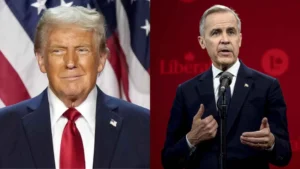
Mark Carney: The Economist-Turned-Leader Poised to Reshape Canada’s Future
Mark Carney, a name synonymous with financial leadership, is now making waves in Canadian politics. As the newly elected leader of Canada’s Liberal Party, Carney is being widely viewed as the frontrunner to become the next Prime Minister of Canada. With a remarkable career in global finance and governance, his transition into the political arena brings a fresh perspective to Canadian leadership.
In this article, we explore Carney’s background, his economic expertise, political ambitions, and net worth, giving you a complete picture of the man poised to shape Canada’s future.

Mark Carney: The Economist-Turned-Leader Poised to Reshape Canada’s Future
About Mark Carney?
Mark Carney is a Canadian economist and banker who has held prestigious positions, including the Governor of the Bank of Canada and Governor of the Bank of England. His expertise in financial regulation and economic policies has earned him a strong reputation as a global thought leader in monetary and fiscal matters.
Born on March 16, 1965, in Fort Smith, Northwest Territories, Canada, Carney grew up in a family that valued education and discipline. He later pursued higher education at Harvard University, where he earned a degree in Economics. His academic journey continued at the University of Oxford, where he completed his master’s and doctoral degrees in Economics.
Mark Carney’s Stance on Climate Change Policies
Mark Carney is a strong advocate for climate action and sustainable finance. He believes that climate change is a pressing economic risk that requires urgent action from governments and financial institutions.
As the United Nations Special Envoy on Climate Action and Finance, Carney has worked to integrate climate considerations into financial decision-making.
His vision includes redirecting private capital toward green investments and implementing sustainable finance policies. If he becomes Canada’s Prime Minister, Carney is expected to champion policies that promote clean energy, reduce carbon emissions, and support a transition to a low-carbon economy.
Mark Carney’s Role in the 2025 Canadian Elections
As the new leader of the Liberal Party, Mark Carney is expected to play a crucial role in the 2025 Canadian elections. His leadership brings a unique combination of financial expertise and policy-making experience.
Carney’s campaign is likely to focus on economic stability, job creation, and climate action.
He aims to position himself as a leader capable of navigating Canada through economic challenges while implementing progressive policies that benefit all citizens.
His approach could appeal to both business communities and environmentally conscious voters, making him a strong contender in the elections.
Mark Carney’s Net Worth and Financial Background
Mark Carney has built an impressive net worth estimated at $35 million USD, thanks to his career in global finance. His wealth comes from high-profile roles in banking, including his tenure as the Governor of the Bank of Canada and the Bank of England.
He also earns substantial income from speaking engagements, book royalties, and investments.
Carney’s financial acumen and experience in wealth management make him an influential figure in discussions about economic policy and financial regulation.
Mark Carney’s Tenure as Governor of the Bank of England
During his time as the Governor of the Bank of England (2013-2020), Mark Carney played a crucial role in stabilizing the UK economy.
He implemented policies to address economic uncertainty, particularly in the wake of Brexit. Carney introduced measures to support financial institutions and ensure economic stability.
His leadership helped mitigate the potential economic fallout of Brexit, earning him global recognition as a skilled financial strategist. His tenure at the Bank of England highlights his ability to manage economic crises effectively.
Mark Carney’s Policies on Sustainable Finance
Sustainable finance is at the core of Mark Carney’s economic philosophy. He believes that financial institutions must align their investments with climate goals.
As a former central banker and climate advocate, Carney has pushed for stronger environmental, social, and governance (ESG) standards in global markets.
His policies emphasize the need for businesses to adopt sustainable financial practices, ensuring long-term economic stability while combating climate change.
If elected Prime Minister, Carney will likely implement national policies that encourage green investments and corporate sustainability.
Mark Carney’s Views on Wealth Inequality
Mark Carney has expressed concerns about wealth inequality and its impact on economic growth. He advocates for policies that ensure economic opportunities are accessible to all citizens.
Carney believes in progressive taxation, fair wages, and financial inclusion. His leadership in monetary policy has consistently aimed at balancing economic growth with social equity.
As a political leader, he may push for policies that reduce income disparity, improve social services, and promote economic mobility for lower-income Canadians.
Mark Carney’s Involvement with the Liberal Party of Canada
Mark Carney has long been associated with liberal economic policies, making his transition into the Liberal Party a natural step. His economic expertise and progressive stance on climate change align with the party’s values.
As the new leader, Carney is expected to focus on economic reform, environmental policies, and international trade.
His leadership style is pragmatic and data-driven, appealing to voters looking for a competent leader who can navigate complex economic and political landscapes.
Mark Carney’s Position on Brexit and Its Economic Implications
Mark Carney played a significant role in mitigating the financial risks associated with Brexit. As Governor of the Bank of England, he implemented policies to stabilise the UK economy and reassure investors.
He warned against the economic consequences of a no-deal Brexit and advocated for strategic trade policies. Carney’s insights into global trade dynamics make him a valuable asset in shaping Canada’s international economic strategy.
His experience with Brexit could inform his approach to strengthening Canada’s trade relationships post-election.
Mark Carney’s Contributions to Global Financial Stability
Mark Carney is widely recognized for his contributions to global financial stability.
Through his leadership at the Bank of Canada, the Bank of England, and various international financial organizations, he has influenced policies that promote stable and resilient economies.
Carney has been a key advocate for regulatory reforms that prevent financial crises. His emphasis on risk management, financial oversight, and sustainable investment practices has had a lasting impact on the global financial system.
Mark Carney’s Perspective on Monetary Policy Challenges
As a central banker, Mark Carney has faced numerous monetary policy challenges, including interest rate fluctuations, inflation control, and financial crises.
He believes in a balanced approach to monetary policy, ensuring economic growth while managing inflation.
Carney has emphasized the need for central banks to be adaptable and forward-thinking in their policy-making. His extensive experience in monetary policy could shape Canada’s future financial strategies if he becomes Prime Minister.
Manus AI vs. DeepSeek: The Truth Behind China’s Latest AI Innovation
Final Thoughts
Mark Carney’s transition from the financial world to politics is a major development in Canadian leadership. His economic expertise, climate advocacy, and progressive policies position him as a strong contender for Prime Minister. As the 2025 elections approach, Carney’s leadership will be tested on multiple fronts.
Whether he secures the highest political office remains to be seen, but his influence on Canada’s economic and political landscape is undeniable.
You may also like
Archives
Calendar
| M | T | W | T | F | S | S |
|---|---|---|---|---|---|---|
| 1 | ||||||
| 2 | 3 | 4 | 5 | 6 | 7 | 8 |
| 9 | 10 | 11 | 12 | 13 | 14 | 15 |
| 16 | 17 | 18 | 19 | 20 | 21 | 22 |
| 23 | 24 | 25 | 26 | 27 | 28 | |












Leave a Reply